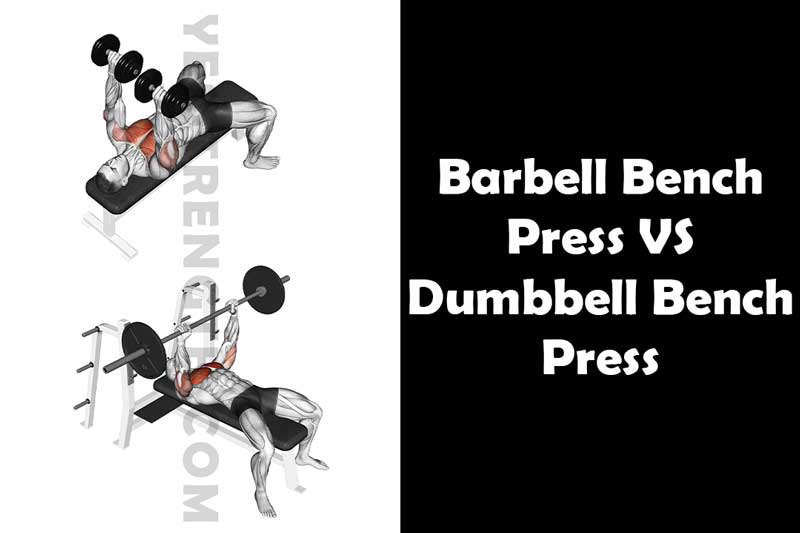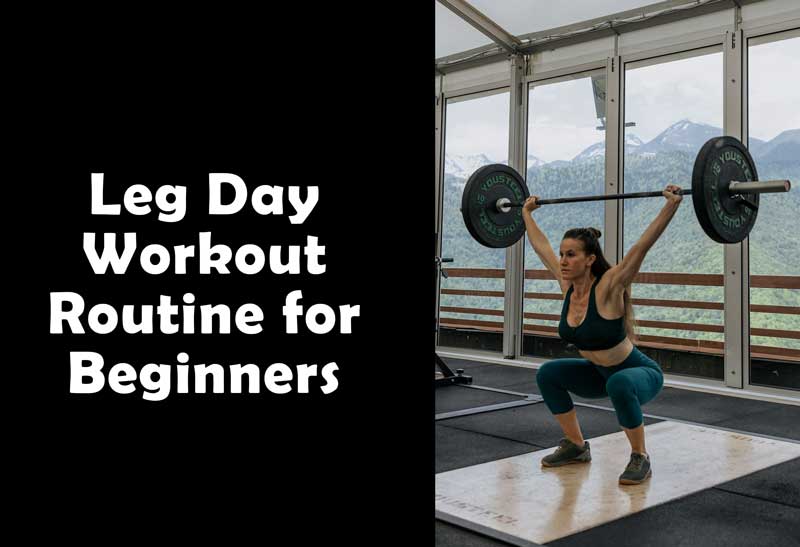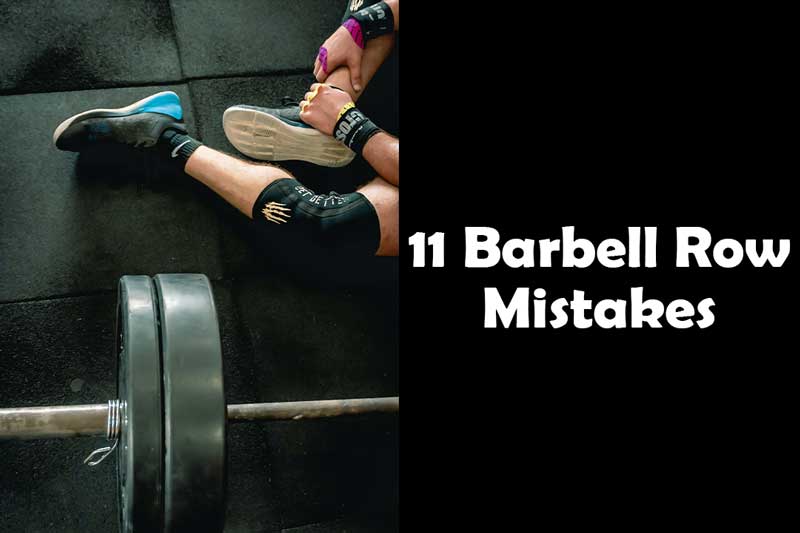Bench press is an excellent exercise for chest development and to tone chest muscles. Within the bench press, the two exercises stand out as the classics are: the barbell bench press and the dumbbell bench press.
These two movements are staples in any strength training program and have been popular among gym-goers for decades. However, each exercise offers its unique set of advantages and challenges.
In this article, we will delve into the differences between the barbell bench press and the dumbbell bench press, exploring their benefits, targeting specific muscle groups, and helping you determine which one is right for you.
Understanding the Barbell Bench Press
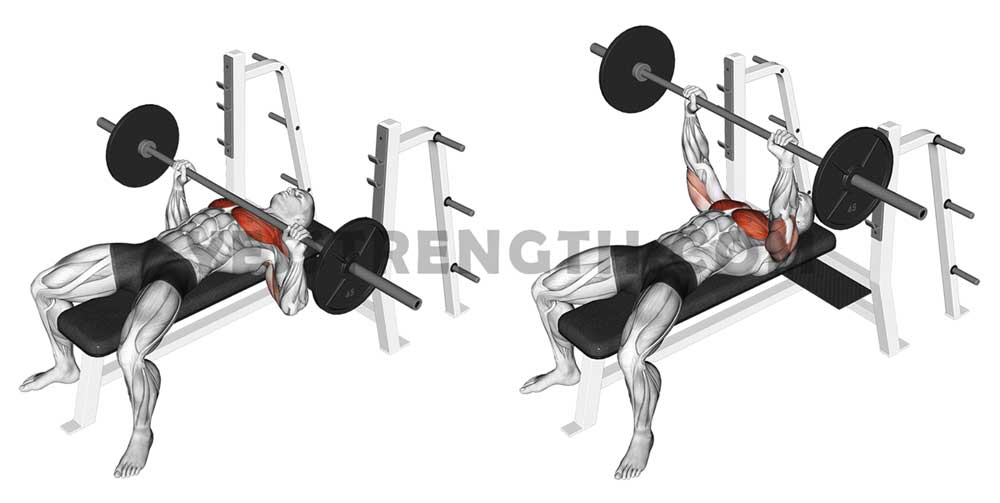
What is the Barbell Bench Press?
The barbell bench press is a compound movement that primarily targets the chest muscles, along with the shoulders and triceps.
It involves lying flat on a bench with your feet firmly on the ground, gripping the barbell slightly wider than shoulder-width apart, and lowering the barbell towards your chest before pressing it back up.
Proper Form and Technique
To execute the barbell bench press correctly, ensure your back is arched slightly, your shoulder blades are retracted, and your elbows are at a 90-degree angle or a little less than 90-degrees at the bottom of the movement. Use a controlled motion to prevent bouncing the barbell off your chest and keep your core engaged throughout the exercise.
Targeted Muscle Groups
The barbell bench press primarily targets the pectoralis major muscles, which are responsible for chest development. Additionally, it engages the anterior deltoids (front shoulders) and triceps as secondary muscle groups.
Benefits of the Barbell Bench Press
The barbell bench press allows you to lift heavier weights compared to the dumbbell bench press, making it an effective exercise for building overall upper body strength. It can help to go beyond the plateau period of bench press for some lifters. It also helps enhance stability and coordination due to the use of both arms working together.
Exploring the Dumbbell Bench Press
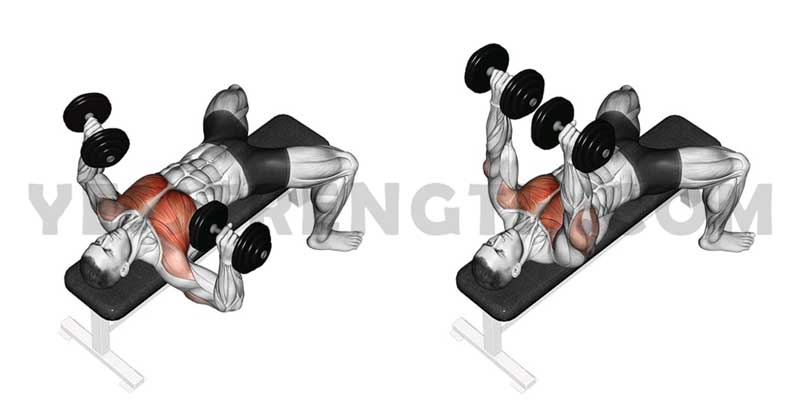
What is the Dumbbell Bench Press?
The dumbbell bench press is another compound movement that focuses on the chest muscles, similar to the barbell bench press.
However, instead of using a single barbell, you use two dumbbells, which allows for a more individualized movement.
Proper Form and Technique
When performing the dumbbell bench press, lie flat on a bench with a dumbbell in each hand. Lower the dumbbells towards your chest and then press them back up while keeping your wrists stable and maintaining control over the weights.
Targeted Muscle Groups
Like the barbell bench press, the dumbbell bench press primarily targets the pectoralis major muscles. Front shoulders and triceps are also targeted.
However, since you are using dumbbells, it also requires more engagement from the stabilizer muscles in the shoulders and arms.
Benefits of the Dumbbell Bench Press
The dumbbell bench press is excellent for developing balanced chest strength as each side has to work independently. It also helps in overcoming strength imbalances between the left and right sides of the body.
Moreover, the greater range of motion offered by dumbbells can lead to improved muscle activation and development. This can make it a little harder to lift heavier weights.
Comparing Barbell and Dumbbell Bench Press
When comparing the barbell bench press and the dumbbell bench press, several factors come into play:
Similarities Between Barbell Bench Press & Dumbbell Bench Press
| Barbell Bench Press | Dumbbell Bench Press |
|---|---|
| Compound movements | Compound movements |
| Target chest, shoulders, triceps | Target chest, shoulders, triceps |
| Promote upper body strength | Promote upper body strength |
| Require proper form and technique | Require proper form and technique |
| Involve pushing movement | Involve pushing movement |
| Can be performed on a flat bench and without bench | Can be performed on a flat bench and without bench |
| Popular and classic exercises | Popular and classic exercises |
| Effective for muscle development | Effective for muscle development |
| Can be incorporated into various workouts | Can be incorporated into various workouts |
Differences Between Barbell Bench Press & Dumbbell Bench Press
| Barbell Bench Press | Dumbbell Bench Press |
|---|---|
| Uses a single barbell | Uses two dumbbells |
| Both arms work together | Each arm works independently |
| Allows for heavier lifting | Typically involves lighter weights |
| Limited range of motion | Offers a greater range of motion |
| Targets primarily the chest | Targets chest and requires more stabilizer muscles |
| May increase injury risk if form is poor | Lower risk of injury due to individual movement |
| Suitable for building overall strength | Enhances muscle activation and balance |
| Easier to progress and add weight | Can help address strength imbalances |
Differences in Muscle Activation
The dumbbell bench press typically results in greater muscle activation due to the need to stabilize two separate weights. On the other hand, the barbell bench press allows you to lift heavier weights, leading to increased overall muscle engagement.
Stability and Balance
The barbell bench press provides a stable movement pattern as both arms work in unison. In contrast, the dumbbell bench press demands greater balance and coordination to prevent the weights from drifting apart.
Injury Risk
The dumbbell bench press generally poses a lower risk of injury since each arm can move independently, reducing the strain on the shoulders and chest. The barbell bench press, however, may increase the risk of injury if the barbell is not lifted with proper form.
Range of Motion
Dumbbells allow for a more extensive range of motion compared to the barbell, which can lead to enhanced muscle activation and development.
Variation and Progression
Both exercises offer variations such as incline or decline bench presses, allowing for targeted muscle development and continuous progress in your training.
Which Bench Press Variation is Right for You?
Choosing between the barbell bench press and the dumbbell bench press depends on several factors:
Factors to Consider
- Training Goals: If your primary focus is on lifting heavy and building overall strength, the barbell bench press might be the better choice. If you seek better muscle activation and balance, the dumbbell bench press is worth considering.
- Fitness Level: Beginners may find the dumbbell bench press more forgiving, while experienced lifters can benefit from the challenge of the barbell bench press.
- Personal Preferences: Some individuals simply prefer the feel and mechanics of one exercise over the other. If you feel you are having more mind-muscle connection in one then you should follow that. But the best advice will to do both once in a while.
Maximizing Your Bench Press Workouts
To get the most out of your bench press workouts, consider the following tips:
Incorporating Both Exercises
To enjoy the benefits of both variations, incorporate both barbell and dumbbell bench presses into your training routine. This way, you can maximize muscle activation and overall strength development.
Frequency and Rest
Allow sufficient rest between bench press sessions to allow for proper muscle recovery and growth. Listen to your body and breathing.
Assistance Exercises
Include assistance exercises that target the chest, shoulders, and triceps to further enhance your bench press performance.
Proper Nutrition and Recovery
Ensure you maintain a balanced diet and prioritize adequate rest to support your body’s recovery and muscle-building processes.
Common Mistakes to Avoid
To prevent injury and optimize your bench press performance, avoid the following mistakes:
Arching the Back
Excessive arching of the back can strain the lower back and compromise proper form. Maintain a slight arch to maintain stability.
Flaring the Elbows
Flaring your elbows excessively can put unnecessary stress on the shoulder joints. Keep your elbows at a comfortable angle throughout the movement.
Bouncing the Bar/Dumbbells
Avoid bouncing the barbell or dumbbells off your chest, as it can lead to injury and reduces the effectiveness of the exercise.
Lifting Excessively Heavy Weights
Focus on proper form and technique rather than lifting weights beyond your capabilities. Ego lift is the major cause of injuries. Push yourself but never lift weights that you are not confident about at all.
Conclusion
The barbell bench press and the dumbbell bench press are both valuable exercises for developing a strong and impressive chest. Each has its unique advantages, and the choice between the two depends on your training goals, fitness level, and personal preferences.
To maximize your chest development and overall upper body strength, consider incorporating both variations into your workout routine. Always push yourself to see the results and your limits.
Barbell Bench Press FAQs
1) How much weight should I lift as a beginner?
As a beginner, lift as much as you feel comfortable with and with which you can do at least 10-12 repetitions. Start with lighter weights and focus on mastering proper form before gradually increasing the load.
2) Can the barbell bench press help with shoulder stability?
Yes, the barbell bench press can contribute to improved shoulder stability when performed correctly.
3) Is it normal to feel sore after bench pressing?
Yes, it is normal to experience muscle soreness, especially if you’re new to bench pressing or significantly increase the intensity of your workouts.
4) Should I use a spotter when performing the bench press?
Having a spotter is recommended, especially when lifting heavier weights, as they can assist you in case you need help.
5) Can the bench press contribute to improving overall upper body strength?
Yes, the bench press is an excellent compound exercise that targets multiple upper body muscle groups, promoting overall strength gains.
Dumbbell Bench Press FAQs
1) Are dumbbells better for targeting individual muscles?
Yes, dumbbells allow for more individualized movement, which can help target and develop individual muscles more effectively.
2) Can the dumbbell bench press help with overcoming strength imbalances?
Absolutely, as each arm works independently, the dumbbell bench press can help address strength imbalances between the left and right sides of the body.
3) Is it essential to have a set of adjustable dumbbells for this exercise?
No, it is not necessary. But adjustable dumbbells offer versatility, but a set of fixed-weight dumbbells can also be used effectively for this exercise.
4) Can the dumbbell bench press be performed with variations like incline or decline?
Yes, the dumbbell bench press can be adapted to incline or decline positions, allowing for additional muscle targeting.
5) Is there any specific advantage of using dumbbells over barbells?
Dumbbells provide a greater range of motion and require more stabilizer muscle engagement, which can lead to improved muscle development and balance.
Always remeber to Say Yes to Strength

